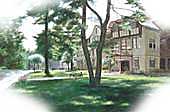Fall
1998
The
Rich and the Poor
Pastor David Bolton
In contrast to the present day teaching of prosperity, Luke's
gospel shows the blessedness that belongs to the poor, and
the dangers that beset the rich. This is summed up in Luke's
account of the Beatitudes,
"Blessed are you who are poor, for yours is the Kingdom
of God ... But woe to you who are rich, for you have
already received your comfort" Luke 6:20,24 NIV.
This Gospel records in detail the humble beginnings of the
life of our Lord. Joseph and Mary were poor common folk. When
Mary praised the Lord in song concerning the child that was
conceived within her, she gives a hint to this,
"My soul praises the Lord and my spirit rejoices in
God my Savior, for He has been mindful of the humble
state of His servant ... He has brought down rulers
from their thrones but has lifted up the humble. He
has filled the hungry with good things but has sent
the rich away empty" Luke 1:46-48,52-53 NIV.
Here we see the exalting of the poor and the bringing down
of the rich and lofty. Jesus was born in a manger, the lowest
of places, yet He was the King of all kings. When His parents
dedicated Him in the temple, they could only afford to offer
"a pair of doves or two young pigeons" (Luke 2:24),
instead of a lamb. The law allowed for this in the case of
the poor (Lev. 12:8).
Jesus never lacked what He needed, yet He did not have "a
place to lay his head" Luke 9:58. Not only was Jesus
poor in this world, but He identified with the poor. In the
end, He was buried in a borrowed tomb (Luke 23:50-53). Paul
says of Jesus,
"For you know the grace of our Lord Jesus Christ,
that though He was rich, yet for your sakes He
became poor" 2 Cor 8:9a.
In the Son of Man, we see God Almighty humbling Himself to
identify with the lowest of men in order to lift them into
the highest and richest place. Paul continues, "so that
you through poverty might become rich" 2 Cor 9:b.
Consider what Luke records concerning John the Baptist, the
forerunner of Christ. John the Baptist called the people to
repentance, but then gave the particulars of how they were
to repent. In the three cases mentioned, riches and money
was the focus of their repentance.
To the crowds he said,
"The man with two tunics should share with him who has
none,
and the one who has food should do the same" Luke 3:11.
He told the tax collectors, "Do not collect more than
you are required to" Luke 3:13. And to the soldiers,
"Be content with your pay" Luke 3:14b. Today, we
may be told, "If you only have two coats, you should
believe for a closet full," or, "you should not
be content with your pay, you are a king's kid and deserve
more." How different are these concepts from those the
New Testament teaches.
Chapter eight of Luke records the parable of the sower. One
of the three unfruitful types of soil mentioned is the one
full of thorns. Jesus explained, "The seed that fell
among thorns stands for those who hear, but as they go on
their way are choked by life's worries, riches and pleasures,
and they do not mature" Luke 8:14. Worldly riches can
choke the Word of God in our lives, making us unfruitful.
In chapter nine, Jesus prophesied His coming betrayal and
death and taught His disciples that they too would be required
to take up their cross and follow Him. He then said,
"What good is it for a man to gain the whole world,
and
yet lose or forfeit his very self?" Luke 9:25 NIV.
The taking up of our cross means that we are willing to give
up the "world" if that is required. Worldly riches
can rob us of fully following Christ.
When Jesus was asked to arbitrate between a man and his brother
concerning the dividing of their inheritance, He said to them,
"Watch out, be on your guard against all kinds of greed;
a man's life does not consist in the abundance of his
possessions" Luke 12:15 NIV.
Jesus then spoke the parable of the "Rich Fool"
which warns about those who "store up things for themselves"
Luke 12:16-21. This can become a snare if we put our trust
in those things, and are not rich towards God. Jesus told
His disciples not to be concerned with things like food and
clothing, but they are to "seek His Kingdom, and these
things will be given to (them) as well" Luke 12:31.
He goes on to tell them,
"Sell your possessions and give to the poor.
Provide purses for yourselves that will not
wear out, a treasure in heaven that will not
be exhausted, where no thief comes near and
no moth destroys. For where your treasure is,
there your heart will be also" Luke 12:33-34 NIV.
Jesus is saying that His Kingdom is a heavenly one, not an
earthly one. As His disciples, we are to sacrifice the earthly
that we might possess the heavenly.
"If you have not been trustworthy in handling worldly
wealth,
who will trust you with true riches ... No servant can serve
two masters. Either he will hate the one and love the other,
or he will be devoted to the one and despise the other. You
cannot serve both God and money" Luke 16:11,13 NIV.
The Lord is to be our Master and money is to be our servant.
If money begins to master us, we have ceased to be God's servants.
Chapter sixteen ends with the story of "the rich man
and Lazarus," which warns those who are at ease in their
riches, and points to God's compassion for those who are poor.
May we change our thinking to see things as God does.
Next, we see Jesus dealing with "the rich young ruler."
This man was seeking eternal life but his riches kept him
from obtaining it. He was not willing to give them up in order
to obey and follow Jesus. Afterward, Jesus told His disciples,
"How hard it is for the rich to enter the Kingdom of
God!
Indeed, it is easier for a camel to go through the eye of
a needle than for a rich man to enter the kingdom of
God" Luke 18:24-25 NIV.
His disciples then wondered if anyone could possibly be saved,
but Jesus said, "What is impossible with men is possible
with God" (vs. 27). He then went on to encourage His
disciples who had forsaken all to follow Him, that whatever
they had given up, they would not "fail to receive many
times as much in this age, and in the age to come, eternal
life" (vs. 30).
Riches make it difficult, though not impossible for us to
enter the Kingdom, but those who do give up the things most
precious to them will be blessed both in this life and in
the life to come.
Chapter nineteen gives the second account of Jesus clearing
the temple of the merchants and the moneychangers. His holy
anger was kindled at those who had defiled God's holy temple
with their greed and irreverence. We see in this how the Lord
is angered when riches become more important than holiness,
reverence, and prayer.
Finally, in chapter twenty two we have the ultimate example
of the dangerous power money can exert, in Judas Iscariot
who was "bought" to betray the Lord with thirty
pieces of silver. Ultimately, whenever money holds its sway
over us, we end up betraying the Lord in one way or another.
May we take warning from the life of Judas Iscariot whose
greed began in a small way, but ended up costing him his life
and the life of our Lord.
In all these Scriptures we see a common thread of truth.
Luke clearly records the fact that money and riches can be
extremely dangerous to our spiritual life. They are not sinful
in themselves, but hold a deceptive and powerful influence
in the hearts of fallen man. They can hinder, or cause us
to completely miss what God has for us. We are to be as free
from the love and control of money as the window who gave
her last two cents to the Lord (Luke 21:1-4).
Luke also shows the compassion and favor that God extends
to the poor. He brings out what is stated in James 2:5, "Has
not God chosen those who are poor in the eyes of the world
to be rich in faith and to inherit the kingdom he promised
those who love him?"
How opposite this is from much modern day thinking in the
church. We need to be readjusted to the truth of the Word.
We are called to deny ourselves now in this world that we
might possess an heavenly inheritance.


